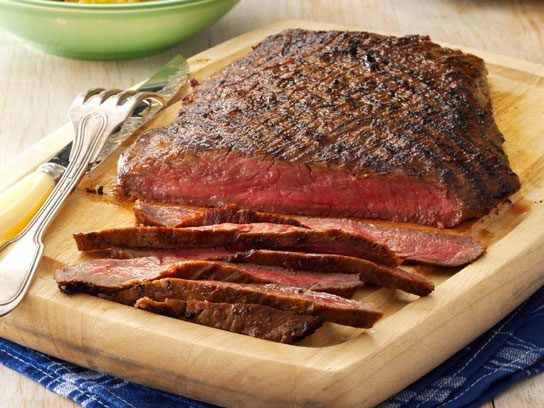Does Eating Meat Really Cause Cancer? 5 Answers Every Steak Lover Needs
Updated: Apr. 15, 2016
The World Health Organization recently published an analysis that concluded that eating red and processed meat is linked to a higher risk of developing cancer. But that doesn’t necessarily mean you need to swear off burgers and bacon.
1. So what exactly did the study find?
The International Agency for Research on Cancer (IARC), which is part of the WHO, reviewed more than 800 studies that examined the link between meat and cancer. The research included people from around the world, of different races and those on different types of diets. The authors concluded that each three-ounce portion of red meat eaten daily increases the risk of colorectal cancer (and in some cases pancreatic and prostate) by 17 percent. For every 1.5-ounce portion of processed meat eaten daily, the risk of colorectal cancer increases by 18 percent. The IARC assigned red and processed meat to two of the five categories it uses to determine how likely certain things—from sunlight to alcohol to tobacco, for example—are to cause cancer.
Red meat (beef, veal, pork, lamb, goat) was placed in the category “probably carcinogenic to humans” and processed meat (bacon, sausage, hot dogs) placed in the “carcinogenic to humans” group. You may have heard that processed meat is in the same group as tobacco use, but that doesn’t mean eating a hamburger raises your cancer risk as much as smoking cigarettes does. The IARC bases its classifications on the strength of scientific evidence that something may cause cancer, not on the actual level of risk.
2. So if I eat meat will I get cancer?
Experts say you don’t have to break up with your morning bacon, egg, and cheese sandwich just yet. The IARC didn’t suggest how much meat is safe to eat, but health experts say it’s all about moderation. “I think it’s very important that we don’t terrorize people into thinking they should not eat any red meat at all,” John Ioannidis, MD, chairman of disease prevention at Stanford University told The New York Times. Dariush Mozaffarian, MD, dean of the School of Nutrition Science and Policy at Tufts University told NPR that while there’s not enough evidence to give specific amounts of meat that are safe to eat, his general recommendations are “no more than one to two servings per month of processed meats, and no more than one to two servings per week of unprocessed meat.”
3. Are certain kinds of meat safer than other kinds?
Lean cuts of meat are always your best option, whether you’re eating chicken or beef. Fattier portions of the animal have more saturated fat and cholesterol, which have been linked to heart disease, diabetes, and premature death. When buying ground meat, look for the fat percentage on the label. If you’re craving a steak, look for cuts with the least amount of marbling (visible fat) and choose ones that are graded “choice” or “select,” which are leaner than “prime.” Minimizing the amount of processed meats like bacon or sausage, which are often high in saturated fat and sodium, is also a smart diet move for your overall health and your waistline.
4. Does it matter how I cook my meat?
As a matter of fact, it does. Studies show that cooking meat at high temperatures that create charring can lead to the formation of carcinogenic chemicals, which can cause changes in DNA that may lead to cancer. A University of Minnesota study found that regularly consuming well-done or charred meat may increase your pancreatic cancer risk by up to 60 percent. If you’re grilling, avoid direct contact between meat and flame and flip frequently. Try a marinade; the American Institute for Cancer Research says that marinating for at least 30 minutes can reduce the formation of carcinogenic chemicals.
5. Is it easier (and safer) for me to just go vegetarian?
Not necessarily. Meat is a good source of protein, vitamins, and minerals your body needs for everything from brain to muscle to immune function. By eliminating meat entirely, you may be missing out on key nutrients that can affect your health if you don’t find other ways to get them.
